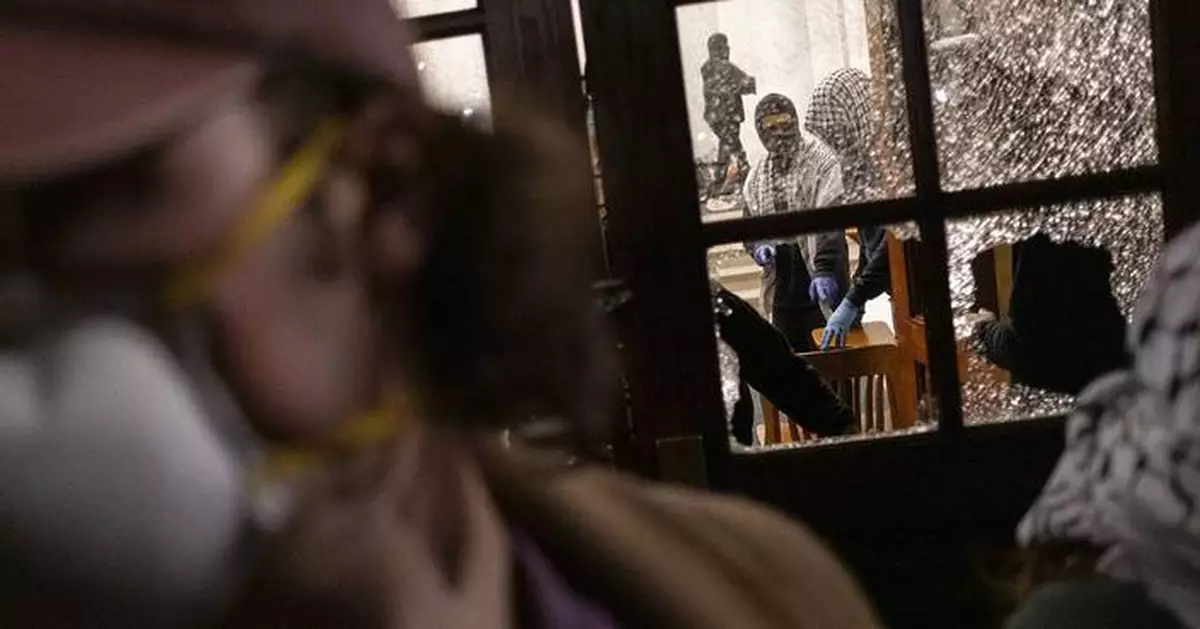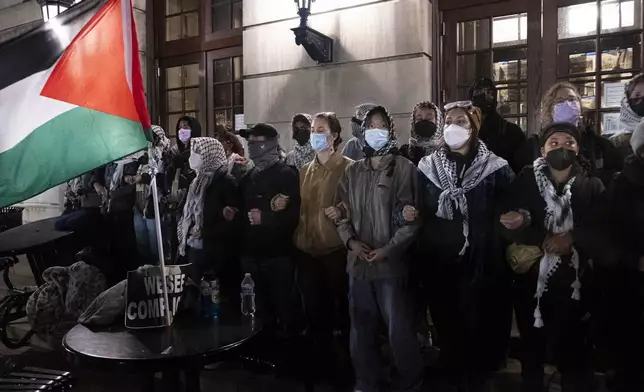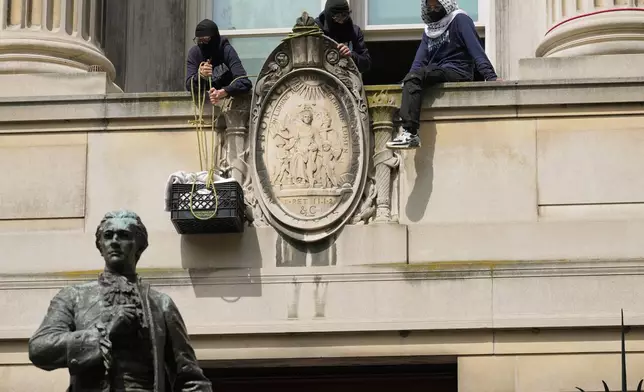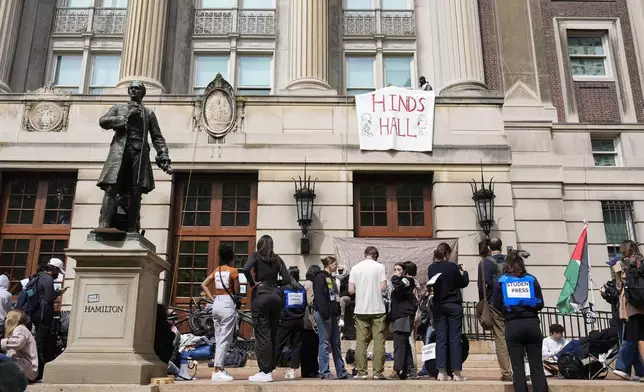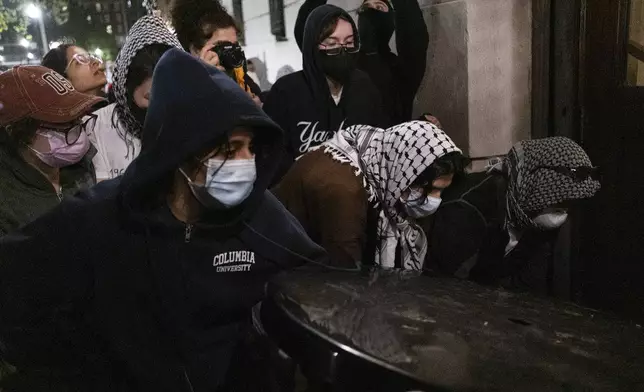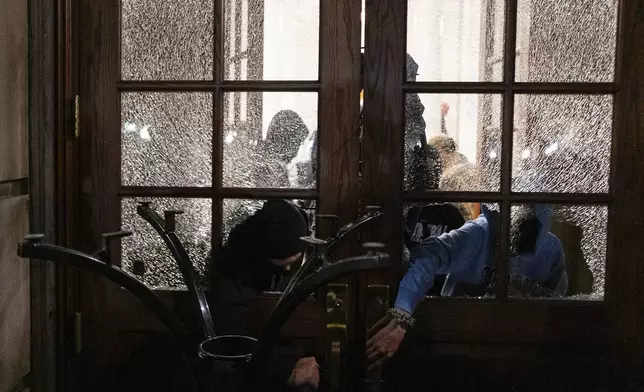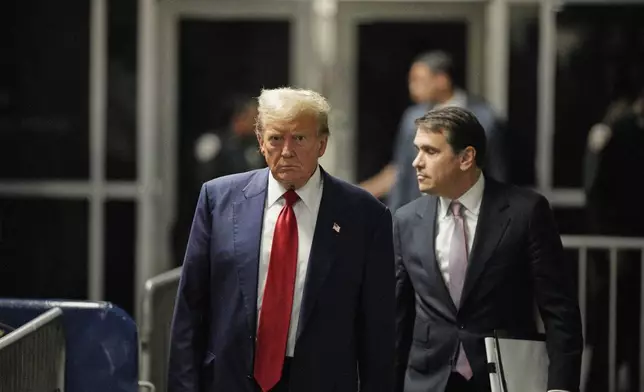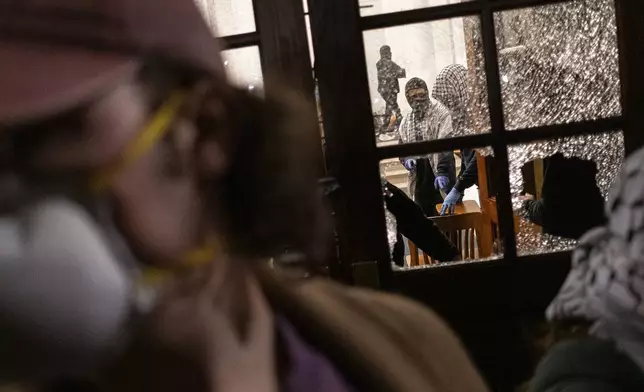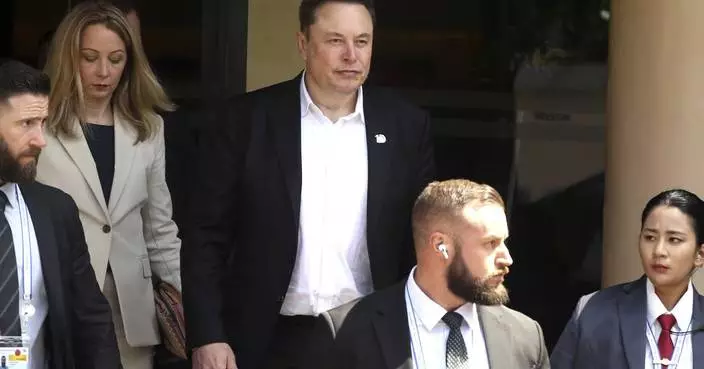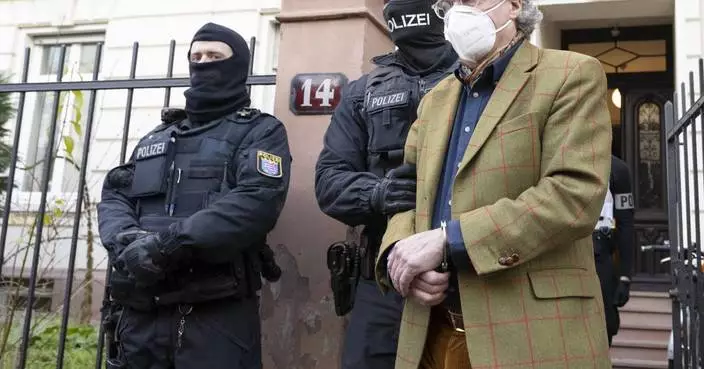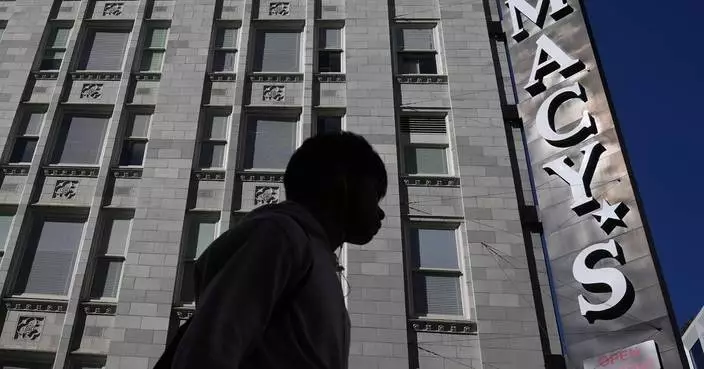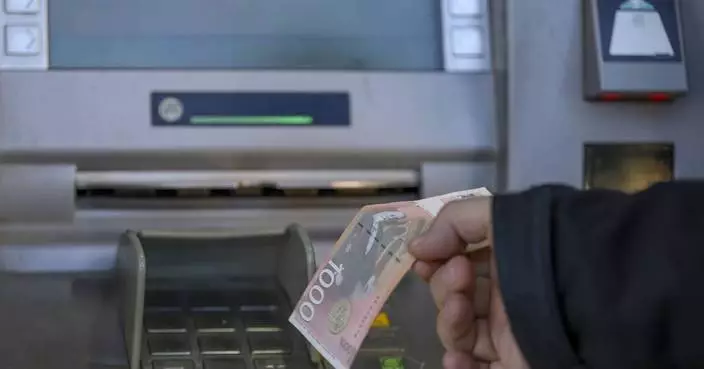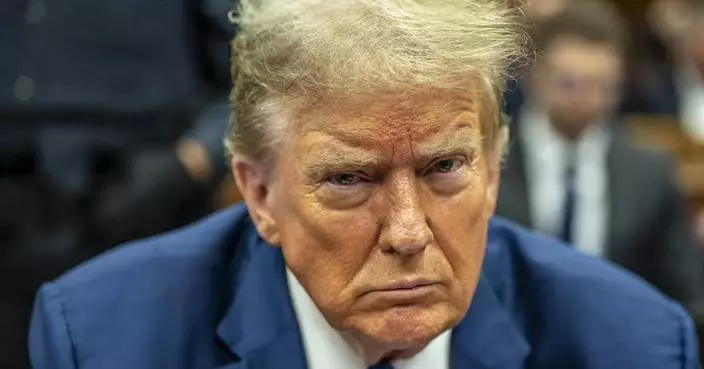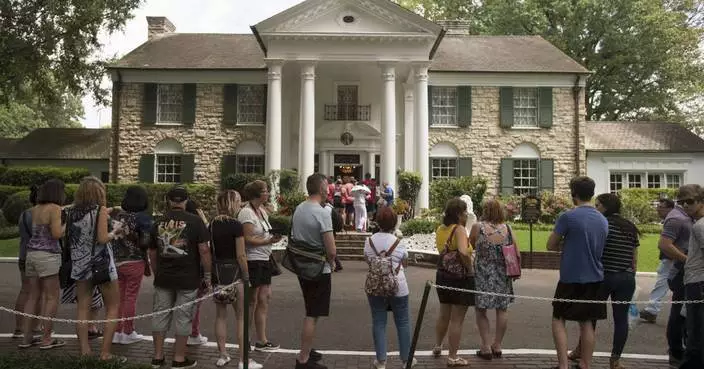NEW YORK (AP) — Donald Trump this week lamented the possibility that Columbia University's pro-Palestinian protesters could be treated more leniently than the rioters who stormed the U.S. Capitol in January 2021, marking the second time the former president has invoked the ongoing campus protests to downplay past examples of right-wing violence.
Speaking Tuesday in the hallway outside a Manhattan courtroom where his criminal hush money trial is taking place, Trump questioned whether student demonstrators who had seized and barricaded a campus building, some of them vandalizing it in the process, would be treated the same way as his supporters who attacked the Capitol on Jan. 6 to stop certification of the presidential results.
Click to Gallery
NEW YORK (AP) — Donald Trump this week lamented the possibility that Columbia University's pro-Palestinian protesters could be treated more leniently than the rioters who stormed the U.S. Capitol in January 2021, marking the second time the former president has invoked the ongoing campus protests to downplay past examples of right-wing violence.
Republican presidential candidate former President Donald Trump speaks at a campaign rally on Wednesday, May 1, 2024, at the Waukesha County Expo Center in Waukesha, Wis. (AP Photo/Morry Gash)
A student protester pulls up a crate filled with foot and supplies from a balcony of Hamilton Hall on the campus of Columbia University, Tuesday, April 30, 2024, in New York. Early Tuesday, dozens of protesters took over Hamilton Hall, locking arms and carrying furniture and metal barricades to the building. Columbia responded by restricting access to campus. (AP Photo/Mary Altaffer, Pool)
Student protesters camp near the entrance to Hamilton Hall on the campus of Columbia University, Tuesday, April 30, 2024, in New York. Early Tuesday, dozens of protesters took over Hamilton Hall, locking arms and carrying furniture and metal barricades to the building. Columbia responded by restricting access to campus. (AP Photo/Mary Altaffer, Pool)
Students with the Gaza Solidarity Encampment block the entrance of Hamilton Hall at Columbia University after taking it over on Tuesday, April 30, 2024 in New York. Columbia Students for Justice in Palestine called for mobilization close to midnight. Students have been occupying part of campus since April 17, calling for the university to divest from institutions that have ties to Israel. (Marco Postigo Storel via AP)
Students with the Gaza Solidarity Encampment block the entrance of Hamilton Hall at Columbia University after taking over it on Tuesday, April 30, 2024 in New York. Columbia Students for Justice in Palestine called for mobilization close to midnight. Students have been occupying part of campus since April 17, calling for the university to divest from institutions that have ties to Israel. (Marco Postigo Storel via AP)
Former President Donald Trump walks outside the courtroom of his trial at Manhattan criminal court, Tuesday, April 30, 2024, in New York. His attorney, Todd Blanche, is on the right. (Curtis Means/Pool Photo via AP)
Students with the Gaza solidarity encampment block the entrance of Hamilton Hall at Columbia University after taking over it on Tuesday, April 30, 2024 in New York. Columbia Students for Justice in Palestine called for mobilization close to midnight. Students have been occupying part of campus since calling for the university to divest from institutions that have ties to Israel. (Marco Postigo Storel via AP)
“I think I can give you the answer right now,” he said. “And that’s why people have lost faith in our court system.”
Trump's remarks demonstrate anew how he and the Republican Party have tried to minimize the deadliest assault on the seat of American power in over 200 years, arguing that violent or criminal behavior by the left is a larger threat. Trump has called the rioters “unbelievable patriots” and has talked openly about the prospect of issuing pardons if he wins a second term.
His comments come as he runs to reclaim the White House and is juggling charges in four separate criminal cases. They promote his position that the charges are being orchestrated by Democrats to keep him out of the White House and that he and his supporters are the targets of political persecution by a fundamentally corrupt justice system.
"They took over a building. That is a big deal,” Trump said of the Columbia protesters. “And I wonder if what’s going to happen to them will be anything comparable to what happened to J6, because they’re doing a lot of destruction, a lot of damages, a lot of people getting hurt very badly. I wonder if that’s going to be the same kind of treatment they gave J6. Let’s see how that all works out.”
Hours later, New York police stormed the campus building the protesters had occupied and arrested several dozen people. The scene prompted Trump during a Wednesday rally in Wisconsin to characterize New York as being “under siege” the night before.
New York City Mayor Eric Adams said those who had taken over the Columbia building would face charges that included burglary, trespassing and criminal mischief. In the Jan. 6 attack on the U.S. Capitol, more than 1,350 people have been charged with federal crimes. Over 800 have been sentenced, with roughly two-thirds receiving terms of imprisonment ranging from a few days to 22 years. According to the Justice Department, 89 have pleaded guilty to federal felony charges of assaulting law enforcement officers.
Legal scholars and political scientists said Trump's strategy could help his campaign, but point out there are stark differences between Jan. 6 and the campus protests against the Israel-Hamas war. College students have gathered in encampments on Columbia and other campuses to call for a ceasefire and demand their universities cut financial ties to Israel.
“The Columbia protests are not aimed at stopping the peaceful transition of power following an election, so they do not threaten the functioning of U.S. democracy,” said Richard Hasen, an expert in election law and professor at the University of California, Los Angeles law school.
Hakeem Jefferson, an assistant professor of political science at Stanford University, said the demonstrations at a Columbia building that also was occupied during a civil rights protest in the 1960s reflect a long tradition of college students “pushing on the conscience” of their country.
“This is a tradition of protest. Disruptive, to be sure. Annoying to university administrators, to be sure," Jefferson said. “To the contrary, what happened on January the 6th was a violent attempt to disrupt the peaceful transfer of power. There is no tradition of that in American history. It is unprecedented. And that is why we should, of course, treat it differently.”
Some of the recent campus protests have erupted into clashes with police, and hundreds of students have been arrested. Protesters in some parts of the country have hurled water bottles or other objects at officers, and police have deployed chemical agents to disperse crowds or carried them away amid screams.
Trump's remarks build on a strategy of Republicans and conservative social media influencers to reframe what constitutes an insurrection as part of an ongoing attempt to influence the public's perception of Jan. 6. They have used the term to describe public demonstrations and even the 2020 election that put Democrat Joe Biden in the White House.
Some social media users on Tuesday called the takeover of Columbia’s Hamilton Hall an “insurrection,” and said the media wouldn’t describe it that way because the views of the protesters aligned with the political left. Fox News used the reference in an article Tuesday about the student protesters, reporting that “the insurrection began at approximately 12:30 a.m.”
Legal experts say the term “insurrection” has a specific meaning — a violent uprising that targets government authority — and that protests that do not involve an attempt to dismantle or replace a government shouldn't be classified that way.
Tuesday was the second time in a week that Trump has compared the campus protests to past examples of right-wing violence.
Last week, he claimed the deadly 2017 rally in Charlottesville, Virginia, where torch-wielding white supremacists chanted “Jews will not replace us” was “nothing” compared to the antisemitism displayed at the campus protests.
“The hate wasn't the kind of hate that you have here,” he said.
He returned to the reference in his comment outside court on Tuesday, saying, “Charlottesville is peanuts compared to what you’re looking at now.”
The campus protests have pitted students against one another, and videos show instances of demonstrators making antisemitic remarks and violent threats. Some Jewish students say the hateful rhetoric has made them afraid to set foot on campus.
Meanwhile, organizers of the protests, some of whom are Jewish, say it is a peaceful movement aimed at defending Palestinian rights and protesting the war.
Columbia University on Tuesday said students occupying Hamilton Hall would face expulsion.
“Protesters have chosen to escalate to an untenable situation — vandalizing property, breaking doors and windows, and blockading entrances — and we are following through with the consequences we outlined yesterday,” said Ben Chang, the university's spokesperson.
Associated Press writer Melissa Goldin in New York contributed to this report.
The Associated Press receives support from several private foundations to enhance its explanatory coverage of elections and democracy. See more about AP’s democracy initiative here. The AP is solely responsible for all content.

Pro Palestinian students lock arms, sing and chant as they braced for New York Police Department officers to raid campus after Columbia University President Minouche Shafik called on the NYPD to dismantle encampments and remove individuals from Hamilton Hall, Tuesday, April 30, 2024 in New York. (Seyma Bayram via AP)
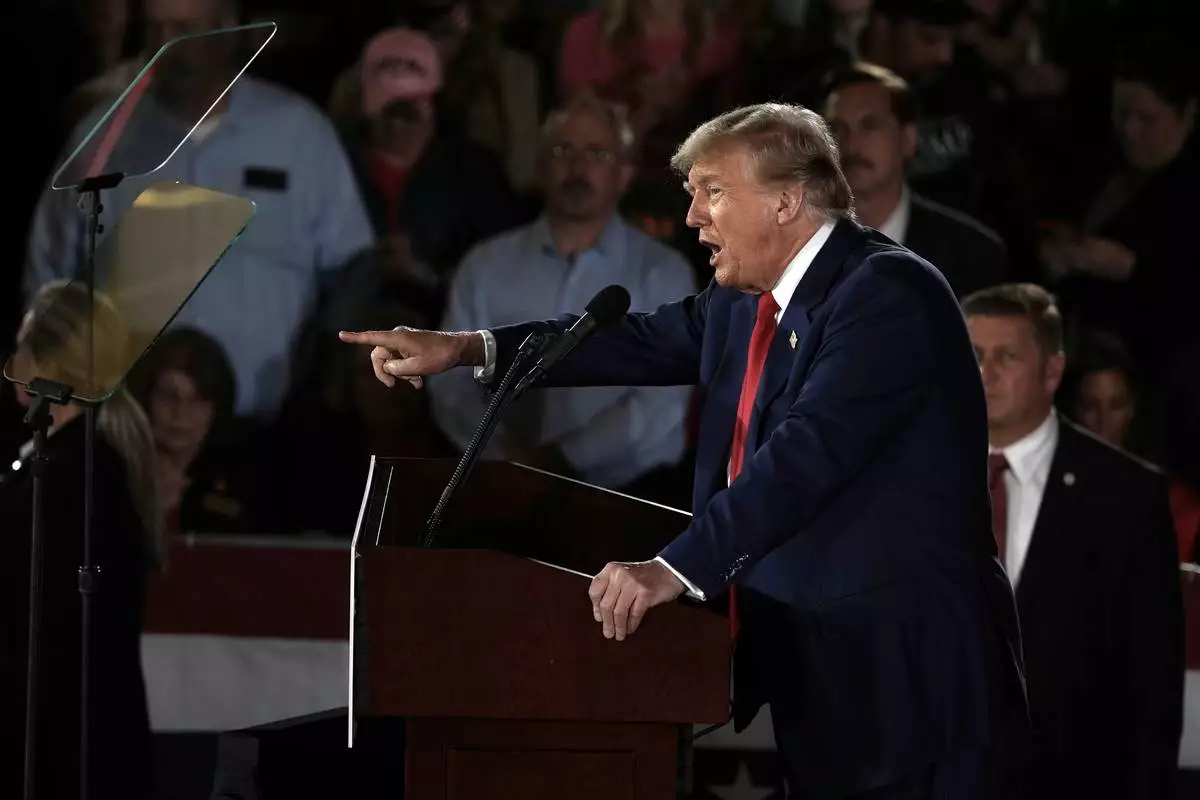
Republican presidential candidate former President Donald Trump speaks at a campaign rally on Wednesday, May 1, 2024, at the Waukesha County Expo Center in Waukesha, Wis. (AP Photo/Morry Gash)

A student protester pulls up a crate filled with foot and supplies from a balcony of Hamilton Hall on the campus of Columbia University, Tuesday, April 30, 2024, in New York. Early Tuesday, dozens of protesters took over Hamilton Hall, locking arms and carrying furniture and metal barricades to the building. Columbia responded by restricting access to campus. (AP Photo/Mary Altaffer, Pool)

Student protesters camp near the entrance to Hamilton Hall on the campus of Columbia University, Tuesday, April 30, 2024, in New York. Early Tuesday, dozens of protesters took over Hamilton Hall, locking arms and carrying furniture and metal barricades to the building. Columbia responded by restricting access to campus. (AP Photo/Mary Altaffer, Pool)

Students with the Gaza Solidarity Encampment block the entrance of Hamilton Hall at Columbia University after taking it over on Tuesday, April 30, 2024 in New York. Columbia Students for Justice in Palestine called for mobilization close to midnight. Students have been occupying part of campus since April 17, calling for the university to divest from institutions that have ties to Israel. (Marco Postigo Storel via AP)

Students with the Gaza Solidarity Encampment block the entrance of Hamilton Hall at Columbia University after taking over it on Tuesday, April 30, 2024 in New York. Columbia Students for Justice in Palestine called for mobilization close to midnight. Students have been occupying part of campus since April 17, calling for the university to divest from institutions that have ties to Israel. (Marco Postigo Storel via AP)

Former President Donald Trump walks outside the courtroom of his trial at Manhattan criminal court, Tuesday, April 30, 2024, in New York. His attorney, Todd Blanche, is on the right. (Curtis Means/Pool Photo via AP)

Students with the Gaza solidarity encampment block the entrance of Hamilton Hall at Columbia University after taking over it on Tuesday, April 30, 2024 in New York. Columbia Students for Justice in Palestine called for mobilization close to midnight. Students have been occupying part of campus since calling for the university to divest from institutions that have ties to Israel. (Marco Postigo Storel via AP)
NEW YORK (AP) — Donald Trump’s lawyers rested their defense Monday in the former president’s New York hush money trial, bringing the case one step closer to final arguments.
The prosecution will get a chance to call rebuttal witnesses now that the defense witnesses have had their turn on the stand. The judge has said he expects closing arguments to happen on May 28, the Tuesday after Memorial Day.
After more than four weeks of testimony, jurors could begin deliberating as soon as next week to decide whether Trump is guilty of 34 felony counts of falsifying business records.
Prosecutors have accused Trump of a scheme to bury negative stories to fend off damage to his 2016 presidential campaign and then falsifying internal business records to cover it up.
Trump, the first former American president to be tried criminally, has pleaded not guilty and denied any wrongdoing in the case, which he has slammed as politically motivated.
THIS IS A BREAKING NEWS UPDATE. AP’s earlier story follows below.
NEW YORK (AP) — A defense witness in Donald Trump's hush money case whom the judge threatened to remove from the trial over his behavior returned to the stand Tuesday as the trial nears its end.
Trump's lawyers hope Robert Costello's testimony will help undermine the credibility of a key prosecution witness, Trump fixer-turned-foe Michael Cohen.
Costello turned to Judge Juan M. Merchan before the jurors arrived to the court, speaking quietly. The judge acknowledged him and nodded, a much more cordial scene than the drama that unfolded during Monday's proceedings, when Costello made comments under his breath during testimony, rolled his eyes and called the whole exercise “ridiculous." The antics angered Merchan, and the judge briefly kicked reporters out of the courtroom to admonish him.
The judge told Costello, a former federal prosecutor, he was being “contemptuous," adding, “If you try to stare me down one more time, I will remove you from the stand," according to a court transcript.
The defense was expected to rest its case later Tuesday, clearing the way for the trial to move on to decisions about how to instruct the jury on deliberations. Prosecutors on Monday rested their case accusing Trump of falsifying business records as part of a scheme to bury stories that he feared could hurt his 2016 campaign. The criminal trial, the first of a former U.S. president, is in the final stretch, with closing arguments expected the Tuesday after Memorial Day.
The charges stem from internal Trump Organization records in which payments to Cohen were marked as legal expenses. Prosecutors say they were really reimbursements for a $130,000 hush money payment to porn actor Stormy Daniels to keep her from going public before the 2016 election with claims of a sexual encounter with Trump. Trump says nothing sexual happened between them.
Trump, a Republican, has said he did nothing illegal and has slammed the case as an effort to hinder his 2024 bid to reclaim the White House.
“They have no case,” Trump said outside the courtroom Tuesday. “There’s no crime.”
After jurors left for the day Monday, defense attorneys pressed the judge to throw out the charges before jurors even begin deliberating, arguing prosecutors have failed to prove their case. The defense has suggested that Trump was trying to protect his family, not his campaign, by squelching what he says were false, scurrilous claims.
Defense attorney Todd Blanche argued that there was nothing illegal about soliciting a tabloid's help to run positive stories about Trump, run negative stories about his opponents and identify potentially damaging stories before they were published. No one involved “had any criminal intent,” Blanche said.
"How is keeping a false story from the voters criminal?” Blanche asked.
Prosecutor Matthew Colangelo shot back that “the trial evidence overwhelmingly supports each element” of the alleged offenses and said the case should proceed to the jury.
The judge didn't immediately rule on the defense's request. Such long-shot requests are often made in criminal cases but are rarely granted.
The defense called Costello because of his role as an antagonist to Cohen since their professional relationship splintered in spectacular fashion. Costello had offered to represent Cohen soon after the lawyer’s hotel room, office and home were raided and as Cohen faced a decision about whether to remain defiant in the face of a criminal investigation or to cooperate with authorities in hopes of securing more lenient treatment.
Costello in the years since has repeatedly maligned Cohen’s credibility and was even a witness before last year’s grand jury that indicted Trump, offering testimony designed to undermine Cohen's account. In a Fox News Channel interview last week, Costello accused Cohen of lying to the jury and using the case to “monetize” himself.
Costello contradicted Cohen's testimony describing Trump as intimately involved in all aspects of the hush money scheme. Costello told jurors Monday that Cohen told him Trump “knew nothing” about the hush money payment to Daniels.
“Michael Cohen said numerous times that President Trump knew nothing about those payments, that he did this on his own, and he repeated that numerous times,” Costello testified.
Cohen, however, testified earlier Monday that he has “no doubt” that Trump gave him a final sign-off to make the payments to Daniels. In total, he said he spoke with Trump more than 20 times about the matter in October 2016.
Trump lawyer Emil Bove told the judge that the defense does not plan to call any other witnesses after Costello, though it may still call campaign-finance expert Bradley A. Smith for limited testimony. It has not said definitively that Trump won’t testify, but that’s the clearest indication yet that he will waive his right to take the stand in his own defense.
Long reported from Washington. Associated Press writers Jill Colvin and Michelle Price in New York; Meg Kinnard in Columbia, S.C.; and Eric Tucker and Alanna Durkin Richer in Washington contributed to this report.
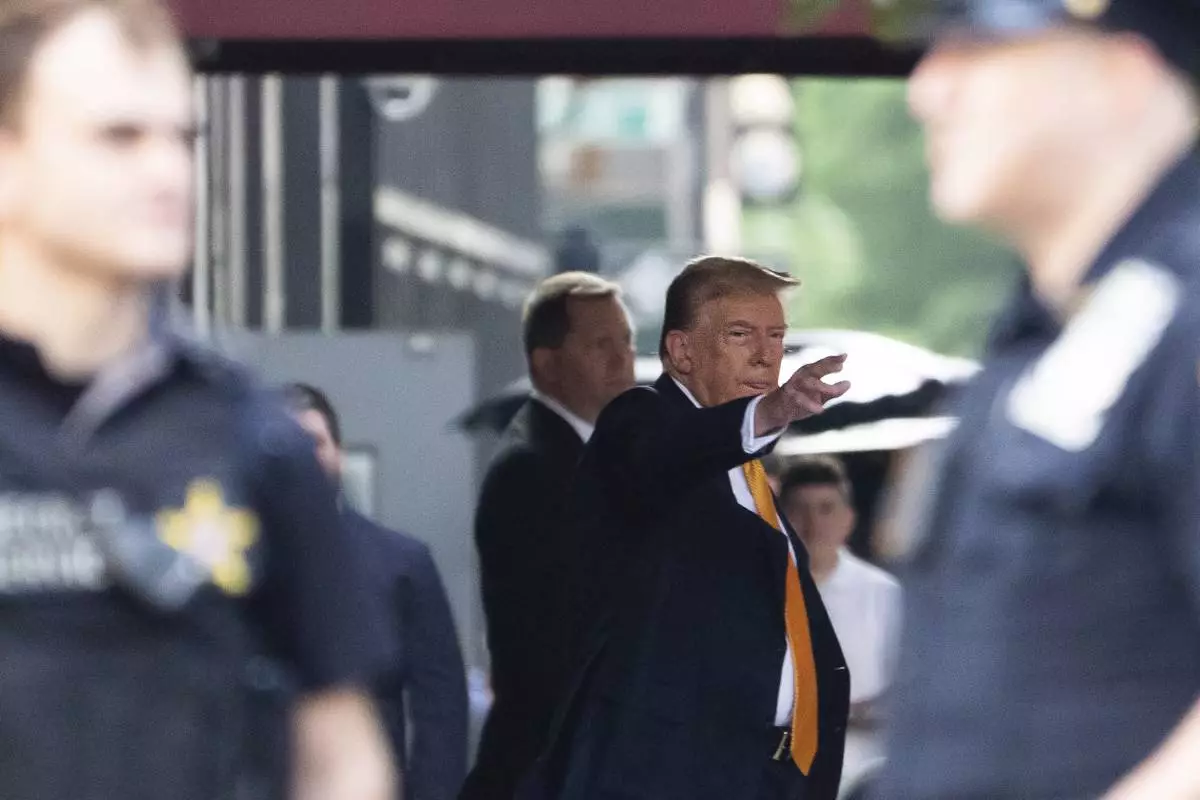
Former president Donald Trump waves while leaving Trump Tower on his way to Manhattan criminal court, Tuesday, May 21, 2024, in New York. (AP Photo/Julia Nikhinson)

Members of the press and public stand outside the courtroom after being asked to leave by Judge Juan Merchan during former President Donald Trump's hush money trial at Manhattan Criminal Court, Monday, May 20, 2024 in New York. Judge Juan Merchan briefly kicked reporters out of the courtroom after admonishing defense witness Robert Costello for his behavior on the stand. (Photo by Michael M. Santiago/Getty Images)

Judge Juan Merchan, left, castigates witness Robert Costello about his "decorum" in the courtroom in Manhattan criminal court, Monday, May 20, 2024, in New York. (Elizabeth Williams via AP)

Former President Donald Trump sits in Manhattan Criminal Court during his ongoing hush money trial, Monday, May 20, 2024, in New York. (Mark Peterson/Pool Photo via AP)

Donald Trump, far left, watches as defense attorney Emil Bove questions Robert Costello, right, with Judge Juan Merchan presiding in Manhattan criminal court, Monday, May 20, 2024, in New York. (Elizabeth Williams via AP)










